Lisa Klink started her Star Trek career as a WGA intern on Star Trek: Deep Space Nine, wrote and sold the episode “Hippocratic Oath,” then went on to join the writing staff at Star Trek: Voyager in its second season. She was a writer, then a story editor, and left the show in its fourth season to flex her creative muscles elsewhere. Recently, she started contributing to a brand-new Star Trek website.
New website: Warp Factor Trek
Warp Factor Trek launched on September 8th in honor of the 55th anniversary of The Original Series premiere on American television. Klink’s first piece for them is titled “How to Pitch Stories for Star Trek,” and she has more features on the way.
“I got involved because of Dan Leckie, who is basically running the site,” she told me. “I’ve been on this podcast [The Scotch Trekker] before. And he invited me to contribute some articles for Warp Factor Trek, which sounded like a lot of fun.”
She mentions that she’s reaching out to other former Trek writers like Bryan Fuller to write pieces for the site and adds that she still has all of her outlines and drafts for “Hippocratic Oath” and has written an upcoming piece about all the variations it went through before it hit the screen. Leckie, who runs the site, promises more pieces like that, and lists another Trek writer, Will Stape, among his regular contributors.
The Deep Space Nine writers’ room
Klink has nothing but great memories of her six-week stint as an intern at Deep Space Nine. At that time (season 4), the writers’ room included showrunner Ira Steven Behr, Ronald D. Moore, René Echevarria, Hans Beimler, and Robert Hewitt Wolfe. “An all-star cast,” she said.
I gotta say that they were so good to me. They were so open. You know, even me being just the intern, they would still be interested in hearing ideas from me. And I really felt very welcome… It was like the ultimate learning experience. It was, like, grad school intensive. I got to sit down on the pitches and on the writers’ meetings and on casting sessions, and I got to go to set. And just everything you could possibly want to know, I had a chance to find out.
Klink’s episode, “Hippocratic Oath,” was directed by René Auberjonois (Odo). Klink recalls:
I found out that Rene would be directing my episode at the production meeting, a few days before shooting began, and was pleased about it. I visited the set a couple of times, but didn’t talk much with him because he was busy. On Deep Space Nine and Voyager, the writer typically didn’t have much contact with the director, either before or during production. I was very happy with how the episode came out. I thought René did a great job with the actors, bringing out the friendship and the conflict between Bashir and O’Brien. I can’t think of anything I would have changed about the episode.
Getting summoned to the Delta Quadrant
After that, Behr recommended her to Voyager executive producer Jeri Taylor, who was looking to add a staff writer to the team. Klink described the call as “the best phone call I ever had in my life.”
I remember just sitting in my apartment, the phone rang, and Jeri Taylor’s assistant Zara said, “I have Jeri Taylor calling for you.” I was like, “Okay.” She [Taylor] said, “You know, we read your script and we liked it and would you like to be on staff at Voyager?” And I think my response was, “REALLY?” You know, this isn’t a joke or something, is it? She assured me that this was a genuine offer. And I of course immediately jumped all over it. I was like, “Yes, can I start in five minutes?”
Life in the Voyager writers’ room
The writing staff Klink joined included showrunner Michael Piller, Jeri Taylor (who took over as showrunner in season 3), Brannon Braga, Ken Biller, and Joe Menosky. Klink was there from season 2 through season 4 (by which time Bryan Fuller had joined the team, Piller had left the show, and Taylor had taken over as showrunner). Klink left in season 4, as Taylor stepped back into a consultant role and Braga took over showrunning duties. Klink has nothing but positive memories of her time there:
The vibe was terrific. I got I got really spoiled, because that was my first gig on a on a show. And Jeri Taylor really ran a very good staff. The room was very open and you weren’t afraid to make stupid suggestions. You know, you weren’t gonna get laughed at or anything like that. It was it was very welcoming. And it didn’t matter sort of what your rank was in the stack. The best idea won out no matter where it came from. And it was, it was a really good experience.
I mentioned that at the Star Trek convention in Las Vegas in August, Jeri Taylor said that she never experienced any problems being a woman on The Next Generation or Voyager, and Klink shared the sentiment.
Jeri really ran a very, very civilized room, I want to say and that everybody was really good to each other and very supportive. So I did not feel like it was a challenge being a woman.
Klink also agreed with Taylor’s description of Janeway as being very much like Taylor herself:
Jeri was the leader of the writers’ room, totally unquestioned. She was in charge the same way the Janeway was without question in charge on Voyager, without having to be nasty or overly forceful—but just without question. She was in charge of everything. And also, one of the beautiful characteristics of Janeway was that she was also someone that people could go to her for scientific support, tech support, emotional support. And Jeri obviously had the chops to be that person you could go to if you writing and production issues.
I asked Klink to describe the standout strengths of each of the writers in the room.
Brannan [Braga] really was very imaginative. And he would always come up with a wild sci-fi concept. Jeri was really always concerned with the characters: How does this affect somebody? And whose episode is it really? And with Michael [Piller], I remember, he would always ask us, “What was this episode about?” Not really, who was it about, but what philosophical or moral issue were we dealing with? He was always really concerned with the bigger picture of what contemporary issues were we dealing with in the sci fi guise. Bryan [Fuller] also was very imaginative, he would often take an episode, even like a character episode, and kind of look at it from a slightly skewed point of view, something that maybe other people wouldn’t think of. And you can see that in his following work, Pushing Daisies and Hannibal, all of the shows that he’s created, he really has an interesting point of view. And that was apparent even in Voyager. I don’t really know if Ken [Biller] had had a really distinctive point of view that I can point to. He likes adventure episodes that had some action. He wasn’t so much into the talky character stuff.
I asked how she thought they’d characterize her if asked the same question.
I would like to think that I was also into character, that I was sort of in the Jeri Taylor model of taking high concept, putting characters into into difficult positions, making them make decisions, sort of developing their relationships with the other characters. That’s what I would like to be known for.
Working with Voyager’s actors
When asked if any of the actors lobbied her for stories (as Robert Picardo was famous for doing), she said that since she was “low man on the totem pole on the writing staff,” it wasn’t something that usually happened. But she did get a concerned call from Tim Russ (Tuvok) after he saw the script for “Innocence,” a story about Tuvok being stranded on a planet with a group of young children.
When the outline went out and went to the cast, there was a notation in the outline that Tuvok would sing a lullaby to the alien kids. And I remember Tim Russ called me and asked, “What’s this about a lullaby?”
He was a little concerned that it was going to be no sappy or saccharin or very unwelcome. And I assured him that it was going to be a very Vulcan lullaby and that it was going to be more of like a lesson in like an Aesop’s fable more than something that would be very sappy. So sometimes the actors did come to me with their concerns, but not very often.
She told me that the stories were true about actors having to call the writers’ room anytime they wanted to change even a word of dialogue, but that she did go visit the set whenever she could.
When I would go down to set, it would just be when I would have free time, which would sometimes be when my episodes were filming and sometimes when other people’s episodes were filming, it was really just a question of when I could get away from my writing duties.
I think it helped me get a feel for production, maybe what was more difficult and what was easier to do for production. And that was something good to keep in mind when we were breaking stories. And I like to think that it made the actors and the crew feel more comfortable with us that they could come to us when they needed to.
Seven of Nine arrives
In the season 3 finale, the character of Seven of Nine (Jeri Ryan) was introduced for the first time. Klink wasn’t part of the discussions around casting, but did remember initial discussions once the decision had been made:
By the time Jeri brought it to the writers room, the decision has been made, and the character had been kind of fleshed out. And so what we really talked about was how to introduce the character and how she was going to fit in with the crew. And I wasn’t really involved in the decision-making as much as I was in the execution of it.
I asked her if she had any negative reaction to Seven’s skin-tight costume at the time:
Yeah, well, in the sense that the marketing basically concentrated all on that. And the skin-tight outfit was unfortunate. Those obviously wouldn’t have been my choices. But the fact was, it was a really good character, and Jeri Ryan was a really good actress. So in the end I think it worked out as a really good contribution to the show. And I really enjoyed writing for that character… And the idea of having a Borg that was separated from the collective just conceptually, that’s a really cool idea.
She also talked about how some of the ensemble cast became less prominent as the seasons went on, something Garrett Wang and Robbie McNeill have also discussed with TrekMovie.
There were characters that I feel like we could have developed more. I mean, the really interesting characters were the really distinctive ones, like Janeway, the Doctor, Seven, Tuvok, B’Elanna, characters that had really distinctive points of view. And so I think that some of our regular human characters like Chakotay and Paris and Kim didn’t maybe get the attention that they could have. They weren’t as, like I said, as distinctive. And so it’s easy to say what a Vulcan’s point of view would be, but just like some, some human guy doesn’t quite jump to mind as “How would he react?” With nine regulars, it’s kind of hard to be equal to everybody. But I think there were some characters that we could have developed better than we did.
Looking to the future
Since she’s been watching Discovery and Picard, I asked her who she’d focus on if given a show about one specific Voyager character. Star Trek: Who?
We established Tuvok as being a husband and father, which is kind hard to imagine for a Vulcan because being part of a family is such an emotional experience. And that’s something that I really enjoyed digging into with “Innocence,” is to see him with kids, to see him sort of as a father figure. So I would be interested to see, once Voyager got back to Earth, Tuvok reunited with his family to see sort of what would happen when he gets reunited with them.
These days, Klink is working on a screenplay and a pilot (and wrote a few episodes of the show Pandora), and writing more articles for the Warp Factor Trek website. She also contributed short fiction to the newly relaunched Star Trek magazine, Star Trek Explorer, writing a TNG-based story when the theme given was Q, whose relationship with Jean-Luc Picard has always fascinated her. She’s a frequent guest on various Star Trek podcasts, which she says are always fun to do.
The podcasts have been really good excuse to get in touch with people and to talk to people again. It’s been great getting back in touch with Robbie and Garrett on The Delta Flyers, and Bryan Fuller, I interviewed him for Inglorious Treksperts. And Tim Russ, I talked to on Inglorious Treksperts and Denise Crosby, we interviewed recently for our Treksperts Briefing Room. So yeah, a good excuse just to call people up and say, “Hey, you want to talk?”
Check out more exclusive interviews at TrekMovie.com.

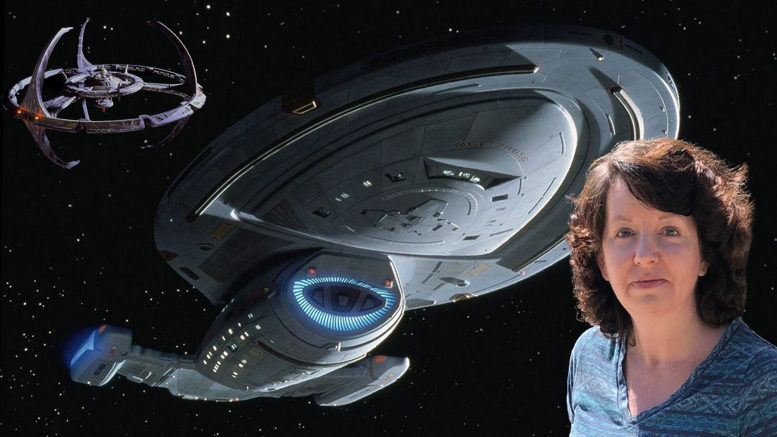
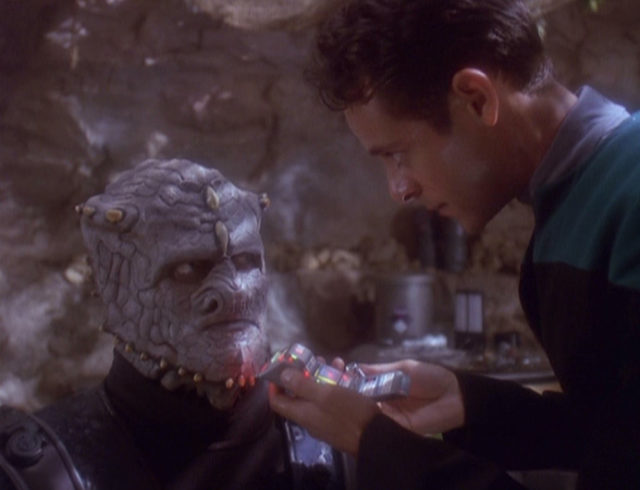
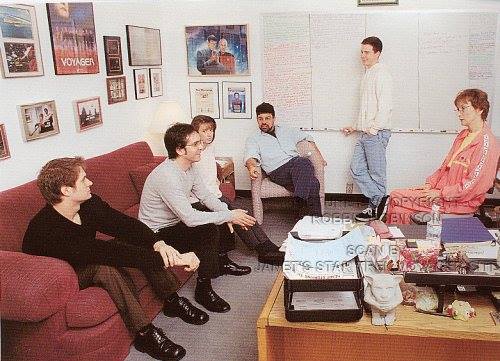
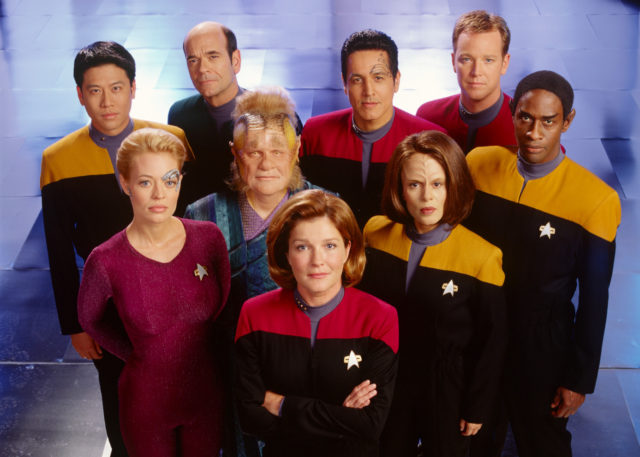
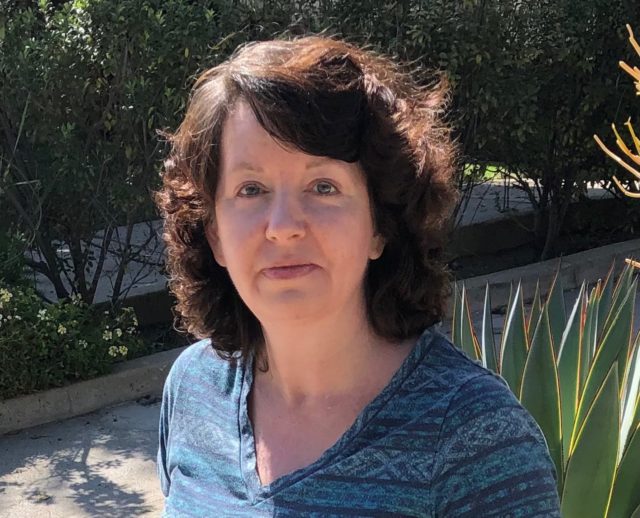

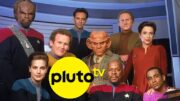
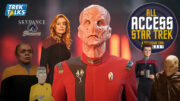
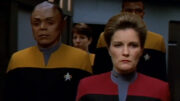
As always thanks for the great interview TM! And while I always love to hear what an actor has to say, listening to writers are always much more interesting because there is no show without them. And you want to hear what kind of ideas came around or how a story was put together. She sound like she had a really great time working on the shows.
Voyager definitely had a rougher time when compared to DS9 when it came to the show’s premise and execution but as someone who rewatched both of them together in my grand rewatch in just the last few months, I realized I still love Voyager today despite its issues and it has become my third favorite show out of all of them. Like most Trek shows, the later seasons got a lot stronger overall. But DS9 has reign king for me as my favorite for the last 20 years.
I wonder will she be interviewed for the doc To The Journey? Still super excited for that!
She will be in To The Journey! She was interviewed for that as well as the Women in Star Trek project Nana Visitor is working on.
Great! Thanks for the info Laurie and great job on the interview!
Warp Factor Trek looks interesting and I’m bookmarking them . TNG , DS9 , Voyager and Enterprise were all ensemble shows and the better for it , even though they all had a strong lead as well . Jeri Ryan’s role as 7of9 is perplexing to say the least , but she is a good actress . I don’t think she needed to be paraded around in a body suit all the time though .
As soon as you mentioned Lisa Klink was writing for Pandora , you had my interest . It’ a great show , and I’m getting it if it hits the shelves ! And kudos to Mark Altman for creating and producing it , even though their Show suffered from a limited budget , and it’s an Imaginative adventure scifi series too !
Voyager comes off as great writing, as compared to the Discovery drivel.
Final warning for trolling and hijacking
“Brannan [Braga] really was very imaginative. And he would always come up with a wild sci-fi concept.”
“The room was very open and you weren’t afraid to make stupid suggestions.”
Does this help explain why the franchise devolved into a nonsensical mess of episodes and Ent became TNG lite after an hour? Maybe, just maybe.
I don’t know what you do to escape that – go play holodeck for the rest of your life, go back in time and try to erase everything again and again, or engage in combat for 10 seconds before the warp core breaches. All of the above?
That is a real problem for any long-running franchise series – running out of ideas and repetition of previous material . And probably why franchises keep changing their guidelines or writers , and can’t get the creative or fresh writers who are too busy elsewhere .
It’s quite interesting Braga is doing The Orville now. That show is basically a fun retreat of previous Trek episodes but being set outside the Trek universe, it gets away with it. Most eps are basically a combination of 2-3 well-known Trek plots. B&B were accused of doing the exact same thing on VOY and ENT.
Actually I don’t mind any of those “remakes”… especially after so many decades. There are better FX nowadays and they can add new twists along the way. But yeah, I think there is potential for SO MUCH MORE, especially on the visual front. Trek could finally start taking the opening monologue literally and create really strange new worlds and lifeforms that we HAVEN’T seen before instead of running through the Californian deserts and caves or Canadian woods and encountering forehead aliens of the week.
‘wild sci-fi concept.”
at the expense of character development, too eager to use ‘re set’
the show got a real boost where lisa on board, shame she left too soon
VOY was a good Trek show. It had its fair share of subpar episodes but that can be said about any other legacy show as well. If VOY is guilty of anything than it’s that it WAS a traditional Trek show that didn’t live up to its different premise. Some people expected them to go in a different direction: more conflict between Starfleet and Maquis crew, more contuity, more darkness and despair. People, including Ronald D Moore expected something like NuBSG which was in many ways VOY done right from those people’s POV. But honestly, I’m glad VOY was done the way it was: TNG with new characters set in another part of the galaxy…
NuTrek, especially DSC and PIC tried hard to turn Trek into something closer to NuBSG: arc-driven, more adult-oriented imagery, more darkness and melodrama… It’s a matter of taste whether you like these changes or not. While interesting, these developments do not fully represent what I personally want to have on Trek but that’s totally up for debate. There are other writing issues but none of them would be pivotal if some fans weren’t unhappy with its style and feel.
So in a way, those new shows realized what people expected from VOY back in the day. After 20 years of a changing TV landscape and changing viewing habbits, the producers just HAD TO try to appeal to a new generation of viewers and it is quite natural not every oldschooler is happy about that. NuTrek does not deserve the level of flaming hatred towards it on YouTube etc… But I do understand some of the issues.
And this is why I believe VOY was best the way it was and I hope we will get a more classic take of Trek on SNW shortly. If SNW is a success, even DSC and PIC (?) may try to embrace a more classic Trek style shortly after. I wouldn’t be too surprised if it turns out that PIC had been set in an already altered reality in S1 and Picard was the only one to realize that.